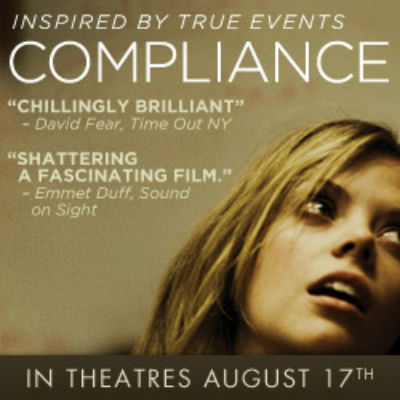NEW YORK — Halfway through a special screening of “Compliance,” the deeply unsettling new film from writer/director Craig Zobel, a woman stood up, yelled out, “Give me a f*cking break,” and walked out of the theater. As the film progressed, other women joined her. At least eight by one count, although in the question-and-answer session following the film, someone suggested that actually 10 had left during the screening.
“Compliance,” shown on Tuesday night at a special screening and panel put together by Psychology Today, is not a Holocaust drama or a gory war film or a Lars Von Trier genital mutilation-fest. It is a psychological thriller grounded in an almost documentary level of reality and will probably hold up as one of the most well-paced, brilliantly acted films of the year.
It was also, without a doubt, the most uncomfortable film experience of my life. Certainly it makes one question what constitutes a “great” film; though I don’t really wish the experience of viewing “Compliance” on anybody, I also haven’t stopped thinking about it.
Further compounding the psychologically disturbing nature of “Compliance” is the fact that it is based almost entirely on true events.
According to the film, in the decade leading up to 2004, more than 70 cases were reported of a man, pretending to be a police officer or some other authority figure, who called a fast-food restaurant and requested strip searches of employees. Each incident shared a similar pattern: The purported officer claimed to need help to solve a case, which required a manager to remove a female employee’s clothing and, in some cases, perform sexual acts on her.
The film is based on one such event, which occurred at a McDonald’s in Mount Washington, Ky., in 2004. In Zobel’s version, Dreama Walker stars as Becky, a blond, teenage employee of “Chickwich,” a fictional fast-food restaurant in Ohio, and Ann Dowd stars — in an epically nuanced, Oscar-worthy performance — as her well-meaning manager, Sandra.
Early in the film, Sandra receives a call from a man claiming to be a local police officer named “Officer Daniels,” who explains that Becky has been accused of stealing from a customer. Officer Daniels then instructs Sandra to remove Becky’s clothes, her belongings, to help him “find the money,” and then — well, it just gets worse from there.
The most unsettling part of “Compliance” (or rather, one of about a million unsettling parts — really the whole movie is one long, unsettling part) is that, from an outsider’s perspective, the whole escalation could have easily been avoided. As an audience member, one knows very early on that the caller isn’t really a cop, so why doesn’t this manager know? Why does she go along with it? Why does young Becky not resist?
At the panel following the screening, psychologist Stanton Peele suggested anyone might do the same thing in a similar situation. Though when the audience was pressed — “How many people in this room think they would have gone along with this scenario if they were present?” Peele asked — no one raised their hands.
“Nobody in this room would have fallen for it? Really?” Peele pressed. “Well, that’s such a wonderful thing.”
Then some of the audience members became vocal. A woman in the back suggested that any “intelligent” person would know right away that the caller wasn’t real, and obviously no cop would request this type of thing from a woman over the phone in a public place. Another man suggested it was a matter of “IQ,” and that anyone with a “high IQ” wouldn’t fall for it.
“These people were working at a fast-food store!” the man explained.
Someone else, however, who said he was also “highly educated,” admitted that he wouldn’t have asked if the man was a real police officer. “If you truly believed there was a threat of consequence, you would have done it,” he said. “A police officer is calling, saying you might lose your job, you might be held accountable if you don’t do these things, you might follow through.”
“This man didn’t call banks and law firms, he called places of vulnerability,” one audience member said.
Psychology Today editor-at-large Hara Estroff suggested that the events in the film paralleled those of the famous experiments done by Yale psychologist Stanley Milgram in the early 1960s, in which he asked various subjects to deliver intense shocks to people in other rooms who wrongly answered a series of questions. The shocks increased with each incorrect answer.
Milgram had surveyed professors and students before carrying out the experiments, and all had told him they would never do such a thing; yet, when the actual experiments were carried out, 65 percent followed through until the end, administering the final 450-volt shock to the unseen victims.
Estroff quoted Milgram: “Ordinary people simply doing their jobs without any particular hostility can become agents in a terrible destructive process. Relatively few people have the resources needed to resist authority.”
Indeed, Peele suggested, the recent Sandusky trial is a perfect example of this.
“The most powerful men at Penn State failed to take any steps for 14 years to protect the children Sandusky victimized,” he said. “They never demonstrated through actions or words any concern for the safety and well-being of Sandusky’s victims until after he was arrested.”
Regardless of whether or not “Compliance” is a film likely to draw widespread interest — it also divided audiences when it screened at Sundance this year — one can’t deny the questions it raises.
The soft-spoken Zobel seemed to appreciate the intense reactions elicited by his film, and to look forward to seeing how the rest of the world would respond. Though he said he originally had no idea what he was getting into when he began working on the film, he said the stories of these prank calls had immediately “riveted” him.
“They’re sensationalist news that you read about, and then the next day it’s not there anymore,” he said. “I’d immediately had such an adverse reaction to it, where I said, ‘There’s no way I would be that guy.’ But I had to ask myself, ‘Am I being honest, that I’ve never been in my life been in a situation where an authority figure has asked me to do something I disagreed with, but I’ve gone along with it because I didn’t feel I had the agency to say no?'”
“Compliance” will be released in select theaters on Friday, August 17.
by Lucas Kavner






